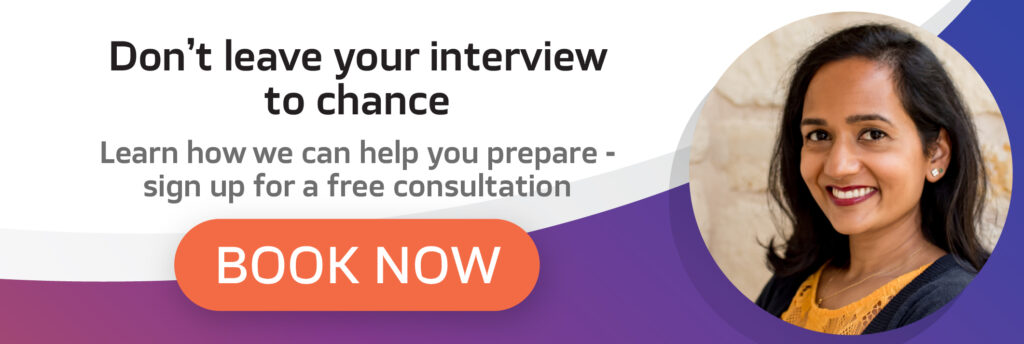An alumni-led MBA interview is conducted by a graduate of the program rather than admissions staff. While often more conversational, it still plays a key role in admissions decisions. Alumni interviewers evaluate your communication, career goals, and cultural fit with the program, while also giving you insight into the school’s community. To succeed, prepare thoroughly, be authentic, and treat the interview primarily as an evaluation but also as a networking opportunity. Having worked with hundreds of candidates to prepare them for alumni-led interviews, here are my insights and top tips.
What To Expect From An Alumni-Led Interview?
An alumni-led MBA interview connects you with a graduate of the program – someone who once sat in your shoes and now volunteers to help evaluate applicants. While every conversation is different, there are a few common features you can anticipate:
- Blind format: Alumni interviewers usually see only your resume, not your full application. This means you’ll need to walk them through your background, goals, and motivations clearly, without assuming they’ve read your essays.
- Evaluation process: After the interview, your interviewer will submit a written report to the admissions committee, which becomes part of your holistic evaluation (meaning that your entire application, including your interview report, will be reviewed before a final decision is made on your candidacy). Your interview performance isn’t the only determining factor by any means, but it can strongly reinforce – or weaken – your candidacy as part of the holistic review.
- Tone and style: Alumni interviews are often more conversational and less structured than admissions-led formats. Still, alumni are trained to assess your communication, leadership potential, and cultural fit.
- Setting: Depending on the school and your location, the interview could happen in person (at an office or a coffee shop) or virtually over Zoom.
- Length: Most last about an hour, but they can range from 30 minutes to 90 minutes depending on the alum’s style and schedule.
- Variability: Schools give alumni interviewers clear guidance on how to conduct the interview and what topics to cover, but not every alum follows the playbook to the letter. Some may stick closely to a list of suggested questions, while others take a more free-flowing approach based where their curiosity leads them.
Which Business Schools Use Alumni Interviews?
Several top MBA programs rely heavily on alumni to conduct admissions interviews, including:
- Stanford GSB – blind, behavioral-focused alumni interviews, typically lasting about an hour.
- Kellogg – one of the pioneers of the alumni interview model, with a long history of leveraging graduates as ambassadors.
- Columbia Business School – most candidates interview with an alum, often in their home city.
- INSEAD – pairs candidates with two alumni, often one with a similar background and one with a different background, to assess fit from multiple perspectives.
- London Business School (LBS) – all MBA interviews are conducted by alumni and include both a traditional interview and a case discussion.
By contrast, some schools use admissions-led interviews (HBS, MIT Sloan), student-led interviews (Yale SOM, UCLA Anderson, Duke Fuqua) or a team-based format (Wharton).
Alumni-Led vs. Admissions-Led Interviews
If you are applying to multiple schools, you might encounter multiple interview formats. Here are some key differences to keep in mind between alumni-led and admissions-led interviews:
- Admissions-led: conducted by staff who are deeply familiar with the school’s evaluation criteria and your full application. They will have prepared specific questions that dig into your particular candidacy.
- Alumni-led: conducted by graduates who bring the perspective of having lived the MBA experience. They may be less formal and more free flowing.
Both formats assess your leadership potential, communication style, and fit – but alumni interviews often double as a chance for you to learn about the school’s culture first-hand, and are even seen by the school as an opportunity for them to market themselves to outstanding candidates.

What Alumni Interviewers Are Looking For
Alumni interviewers are not final decision-makers, but their written reports feed directly into your application review. They look for:
- Clarity of goals – Can you articulate why you want an MBA and why this school?
- Fit with community – Do your values, personality, and leadership style align with the school’s culture?
- Communication skills – Are you persuasive, engaging, and able to hold a thoughtful conversation?
- Professional impact – Do your experiences suggest you’ll contribute meaningfully in class and beyond?
Common Alumni Interview Questions
Expect variations of these staples:
- Tell me about yourself / Walk me through your resume.
- Why an MBA, and why now?
- Why this business school specifically?
- What are your short- and long-term career goals?
- Tell me about a leadership experience.
- Share a time you faced a challenge or conflict at work.
- What will you contribute to the school’s community?
How to Prepare for an Alumni-Led Interview
- Do your homework – Research your interviewer on LinkedIn. Note points of connection, which may be useful to help you break the ice, but avoid overfamiliarity.
- Craft your elevator pitch – Be ready with a concise 30–60 second story about who you are and what drives you.
- Practice behavioral answers – Use the STAR method (Situation, Task, Action, Result) to structure clear, compelling examples of what you’ve done.
- Know your “why” – Be prepared to connect the dots: why MBA, why this school, why now.
- Ask smart questions – Alumni can share unique insights into the student experience, culture, and alumni network. They usually appreciate your curiosity about their perspective.
- Mind your presentation – Dress appropriately – check out our advice on what to wear for your MBA interview. Even on Zoom, first impressions count.
Mistakes to Avoid in Alumni-Led Interviews
Here are the common pitfalls we’ve seen candidates make in alumni-led interviews:
- Being unprepared. Some candidates assume the informal tone means they can just “show up and chat.” Alumni do notice whether you’ve practiced your pitch and prepared thoughtful talking points. Treat the interview with the same seriousness you would a critical job interview.
- Sounding over-rehearsed. On the flip side, avoid memorized or robotic answers. Alumni want a natural dialogue, not a script. Practice enough to be clear and confident, but stay flexible so you can adapt to the flow of conversation.
- Lacking knowledge of the school. A generic answer like “I want to study at Columbia because of its strong finance program” isn’t going to impress an alum who spent two years living that experience. Demonstrate that you’ve gone deeper by referencing aspects of the culture, teaching style, or community that resonate with your own values.
- Asking boring questions. This is your chance to ask the questions only an insider can answer. Don’t waste it on things you could easily find online. Instead, ask about their favorite courses, what surprised them most, or how the alumni network has helped their career.
- Failing to connect personally. Remember that alumni are volunteers who love their school. If you come across as transactional or one-dimensional, you risk leaving a flat impression. Share your enthusiasm, let your personality show, and look for genuine points of connection.
- Failing to show gratitude – Alumni are usually extremely busy people and they are volunteering their precious time to conduct your interview. So don’t forget to show your appreciation. A warm and polite thank-you note afterward goes a long way.
Conclusion & Next Steps
The alumni-led MBA interview is both a formal evaluation and a great opportunity to connect with someone who has lived the MBA experience you aspire to. Because alumni often bring their own style and personality to the discussion, no two interviews are alike. That’s why preparation is so valuable: practice ensures you can adapt with confidence, highlight your strengths clearly, and leave a lasting impression no matter where the conversation goes. The better prepared you are, the more natural and engaging you’ll feel in the moment.
Could you use a practice session with an expert? Book an MBA Interview Prep Session with Fortuna.




